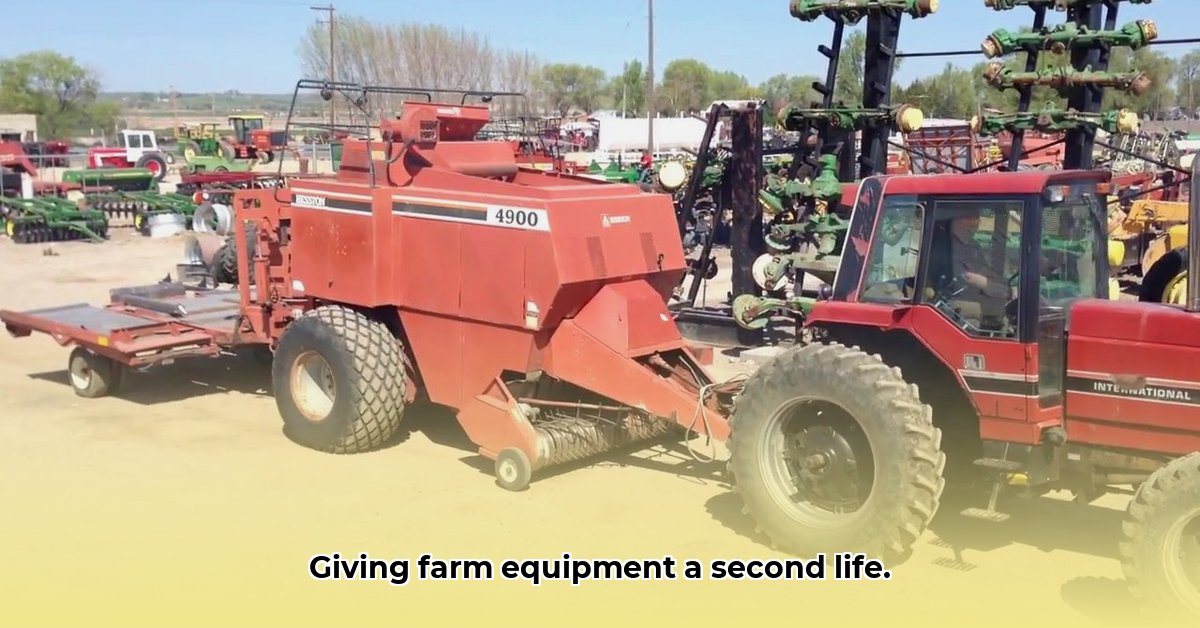
A Case Study in Sustainable Agricultural Practices
Nyssa Tractor Salvage (NTS) in Oregon presents a compelling case study in sustainable agriculture, demonstrating how a used farm equipment and parts reclamation business can contribute to environmental responsibility and economic viability within the agricultural sector. NTS operates beyond the typical used equipment dealership model, actively promoting a circular economy and extending the lifespan of farm machinery. This case study analyzes NTS's business model, explores its environmental impact (within the limitations of available data), and provides actionable recommendations for various stakeholders. Learn more about NTS's operations at their website.
NTS's Operational Model: A Deep Dive
NTS distinguishes itself through a multifaceted approach that combines parts reclamation, efficient online auctions, and a commitment to customer service. Instead of simply discarding broken-down farm equipment, NTS meticulously disassembles machines, meticulously salvaging usable parts. These parts are then meticulously cataloged and offered through a user-friendly online auction system, connecting them with farmers nationwide needing repairs or replacements. This process not only reduces waste sent to landfills but provides farmers with a cost-effective source of reliable components. The company further bolsters its commitment to customer trust by providing warranties on its equipment, thereby creating a loyal customer base and contributing to the overall sustainability of the business. This commitment to customer satisfaction builds a resilient business, reducing the risk of costly equipment failure for its customer base.
This approach reduces overall equipment replacement needs, positively impacting the environmental footprint of the agricultural sector. The online auction system reduces operational costs while expanding the market reach.
Environmental Impact: Assessing and Addressing Challenges
While quantifiable data regarding NTS's precise environmental impact remains limited, several key observations highlight its potential for significant positive contributions. By reclaiming parts and reducing the demand for new equipment production, NTS demonstrably reduces waste going to landfills. This considerably lowers the environmental cost associated with the manufacturing of new machinery, a process known for its substantial resource consumption and waste generation. However, the transportation of parts and equipment undeniably contributes to fuel consumption and associated carbon emissions. A complete environmental analysis requires further research to quantify both the positive and negative impacts, particularly concerning the carbon footprint of transportation. Such an analysis should also assess the total lifecycle impact of using reclaimed parts, factoring in the additional production associated with new parts as a comparison metric.
Actionable Recommendations for Stakeholders
The unique model employed by Nyssa Tractor Salvage presents significant opportunities for various stakeholders. The following table outlines specific, actionable recommendations:
| Stakeholder Group | Short-Term Actions | Long-Term Strategies |
|---|---|---|
| Nyssa Tractor Salvage | Enhance online platform UX/UI; Expand targeted marketing campaigns to reach new customer segments; Implement advanced inventory management system. | Explore strategic partnerships with equipment manufacturers; Develop value-added services (e.g., equipment diagnostics, repair services); Invest in data analytics to track and optimize environmental impact. |
| Farmers/Customers | Leverage warranty benefits; Prioritize purchasing used equipment whenever feasible; Adopt sustainable agricultural practices. | Advocate for policies that support sustainable equipment management; actively seek out locally sourced parts and equipment. |
| Competitors | Analyze NTS's operational efficiency; Identify opportunities for process improvement and adopting sustainable practices; Consider incorporating similar elements into their own business models. | Develop innovative and sustainable alternatives to address the increasing demand for cost-effective and environmentally friendly farm equipment solutions. |
| Policymakers/Regulators | Provide incentives to support businesses that promote sustainable equipment lifecycle management; Invest in infrastructure (e.g., improved rural transportation networks) to facilitate sustainable equipment logistics. | Develop comprehensive regulations to minimize waste generation in the agricultural sector and promote environmentally responsible practices. |
Conclusion: A Model for Sustainable Agriculture
Nyssa Tractor Salvage's operational model showcases a viable and impactful strategy for promoting sustainable agriculture. By incorporating parts reclamation, efficient online auctions, and a focus on customer satisfaction, NTS demonstrates how a used equipment business can simultaneously benefit the environment and the agricultural community. While further research is needed to fully quantify the environmental impact, the company's efforts in reducing waste, extending the lifespan of farm equipment, and promoting accessibility clearly contribute to a more sustainable and economically viable agricultural ecosystem. The NTS model provides a valuable template for other businesses and policymakers seeking to promote environmentally responsible and economically sustainable agricultural practices.